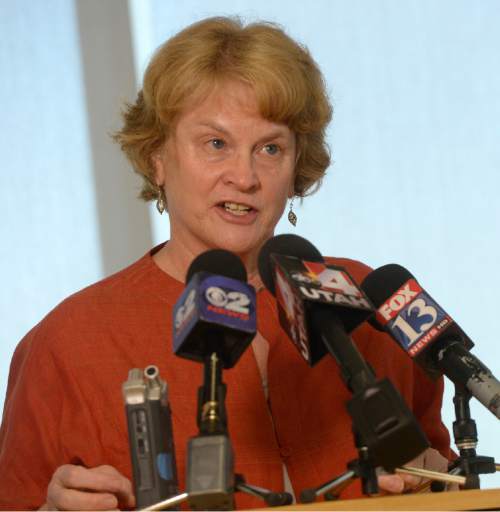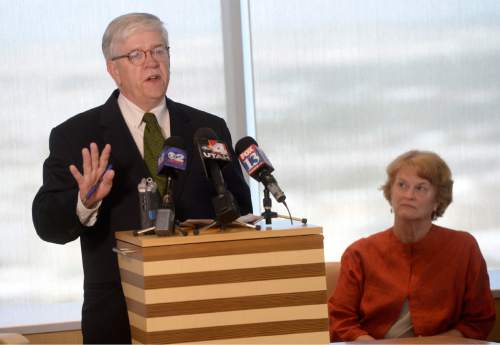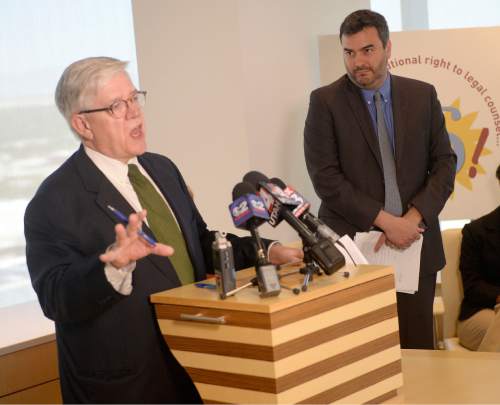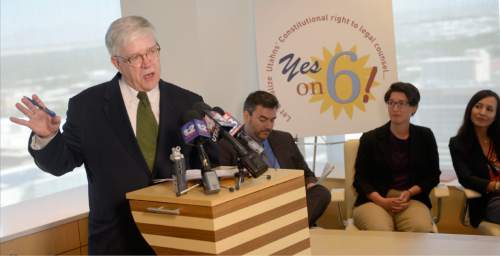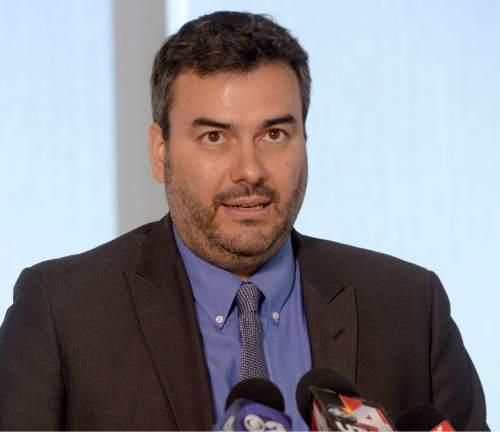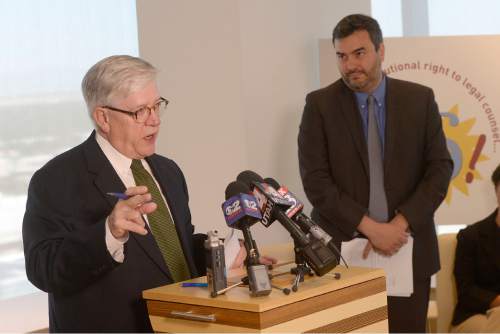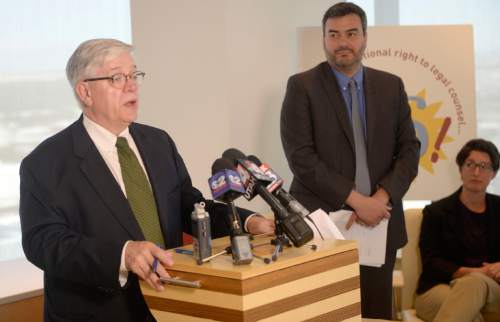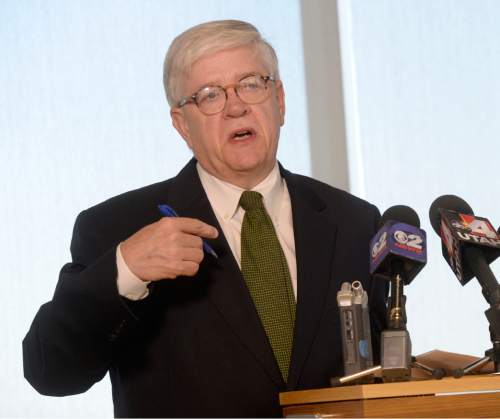This is an archived article that was published on sltrib.com in 2016, and information in the article may be outdated. It is provided only for personal research purposes and may not be reprinted.
The American Civil Liberties Union of Utah filed a proposed class-action lawsuit Tuesday targeting Utah's anemic indigent-defense system — a system that they say is inadequate, underfunded and unfair to Utahns accused of crimes who rely on public defenders.
The lawsuit, which lists six named plaintiffs who are men in county jails facing a variety of charges, asks a 3rd District Court judge to declare unconstitutional the state's public defense system.
The legal action comes three months after state legislators set aside $2 million to fund the creation of a statewide commission that would oversee indigent-defense services.
But lawyers with the ACLU and co-counsel firm Holland & Hart LLP said Tuesday that the legislative action was not enough to meet the state's constitutional requirement to provide legal help to those who cannot afford it.
"We're not hoping to wave a magic wand or think that we can dictate what the perfect solution would be," John Mejia, ACLU legal director, said during a news conference. "We're here to make sure that the state understands that it is a violation, what they're doing, and to start getting immediate, meaningful solutions."
The U.S. Supreme Court ruled in 1963 that any defendant facing possible jail time is entitled to counsel, even if the defendant can't afford it. Utah is one of two states in the nation that delegate that responsibility to individual counties, which have had no state oversight up to this point to guide their efforts in meeting the Sixth Amendment obligation.
And how each county handles that responsibility differs. In Salt Lake and Utah counties, a nonprofit public-defender office provides services, but other counties rely on contracting public defenders or private attorneys — sometimes for a flat fee, regardless of caseload. This can lead to a crushing number of cases, and public defenders often won't — or can't — ask for funds for experts or private investigators.
And that is just one of myriad problems with the indigent-defense system, according to studies by the ACLU and the Sixth Amendment Center. There is a lack of uniform structure, no state oversight and inadequate funding that varies from county to county, the studies found. And some county prosecutors are involved in picking who fills public defender contracts, in essence handpicking whom they will go up against in court.
"The state has completely shoved and delegated this responsibility to the counties and have literally gone away," attorney John Harrington said. "They've pushed it down into the local levels and said, 'That's good enough. We have fulfilled our constitutional duty.' We don't think that's the case. … We are in the Dark Ages when it comes to public defenders in the state of Utah."
Harrington said the state's solution, in the form of a statewide Indigent Defense Commission, "has no teeth to it" because there is no enforcement ability. If a county doesn't comply with the commission, according to the lawsuit, the only sanction it can receive is to lose a state grant or not be considered for one.
Sen. Todd Weiler, R-Woods Cross, sponsored the bill that created the statewide commission, which has responsibilities that include collecting data, reviewing public-defender contracts, creating caseload guidelines and doling out money from a trust fund to counties that need it for defense services.
The senator called the timing of the ACLU's lawsuit "really unfortunate," saying the commission members were just appointed last week.
"For the first time in 40 years, we're trying to make a worthy attempt to tackle this issue, and now we've got kind of sidetracked with the ACLU," he said. "It would be nice if they actually gave the commission a chance to get to work."
Officials with the Utah attorney general's office echoed similar sentiments about the timing of the legal action, saying a lot of work has been done in the past year and during the legislative session to make changes.
"To ask a judge to review these measures now, before any opportunity to see the results of that effort, is premature," said Parker Douglas, chief federal deputy and general counsel of the attorney general's office. "[It] will require a single judge to review the collective efforts of the many interested stakeholders who have spent thousands of hours addressing the same issues."
But advocates for criminal defendants said too much time has passed, and a lawsuit was the necessary next step.
The commission just isn't enough, said Kent Hart, Utah Association of Criminal Defense Lawyers executive director.
"We have people appearing in court today in Utah who will not be given the resources to defend themselves," he said. "Not all of them are innocent, but all of them deserve a chance. And those innocent people, they likely do not have resources to prove their innocence. It's hit or miss. It's kind of luck of the draw, depending on where you get pulled over."
Twitter: @jm_miller —
The plaintiffs
Six men, all incarcerated in three rural county jails, are the named as plaintiffs in an ALCU lawsuit filed Tuesday. Their alleged crimes range from drug possession to violating a no-contact order to burglary — and all qualify for a public defender.
Colter Ricks, who has been in the Cache County jail since the end of May, has never met with his appointed attorney and doesn't expect to see the lawyer until a court hearing later this month.
Bryce Lloyd, a Tooele County inmate, has met only once with his public defender, and it was in the presence of several other defendants, according to the lawsuit. He has stopped trying to contact his public defender because the attorney has been "habitually unresponsive."
The other plaintiffs are Anthony Murdzak, Brandon Timms, Colton Remick and Skyler Garner, who all say they have either not met their public defender or have spent only minutes with the assigned attorney.
John Harrington, an attorney with the firm Holland & Hart LLP, said the plaintiffs were chosen after six staff members visited county jails, looked up cases and interviewed as potential candidates inmates who had been arrested and qualified for public defenders, but had not gone to trial. "These plaintiffs are everywhere," Harrington said Tuesday.


